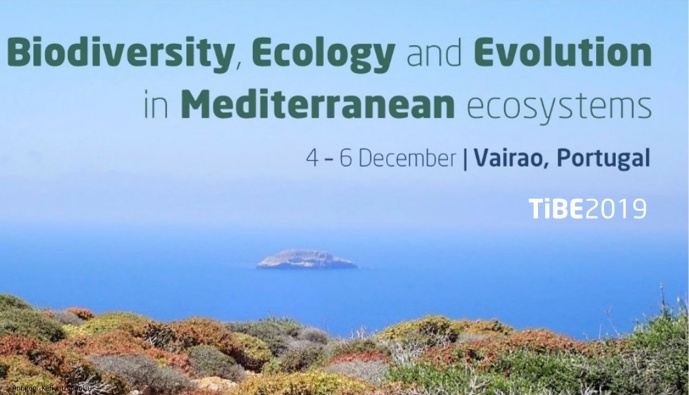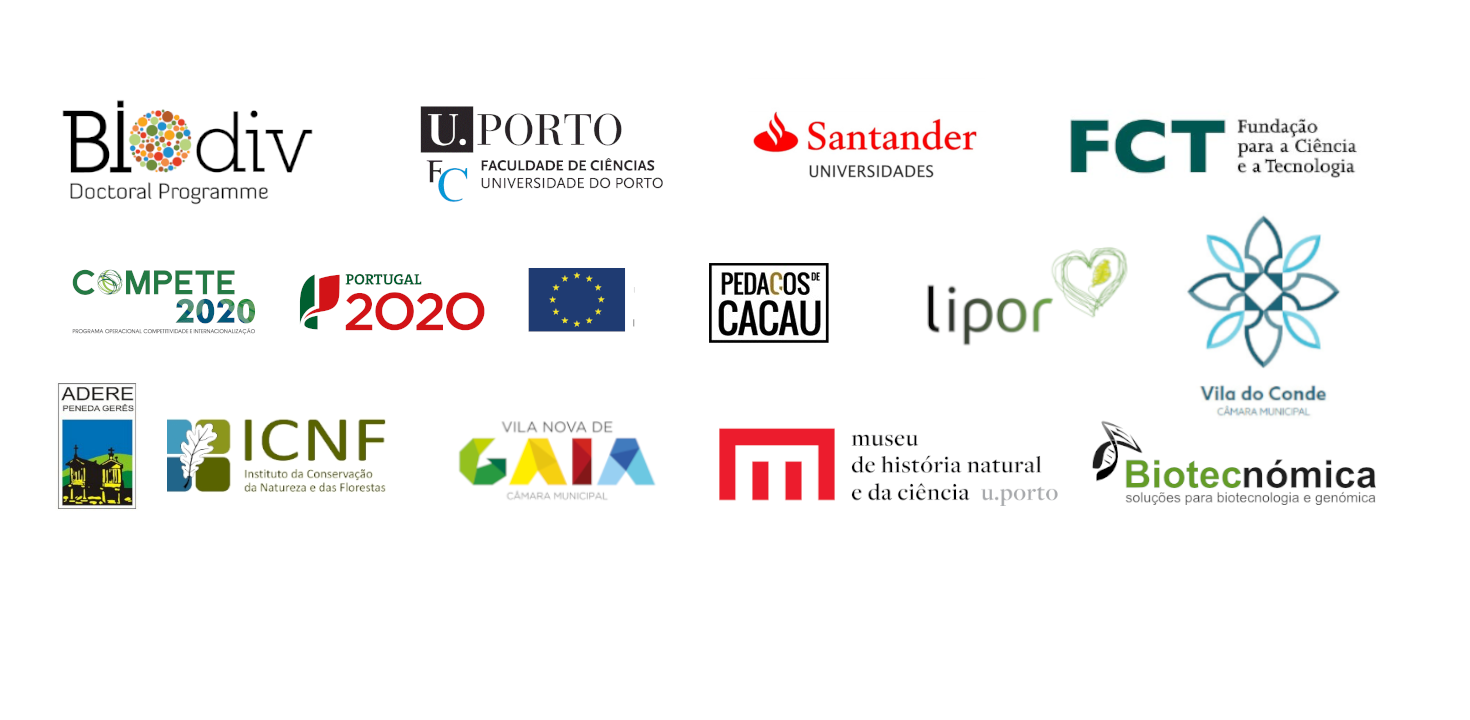TiBE 2019 | BIODIVERSITY, ECOLOGY AND EVOLUTION IN MEDITERRANEAN ECOSYSTEMS

We are pleased to announce the 9th edition of TiBE, Trends in Biodiversity and Evolution Conferences, an annual meeting organized by CIBIO-InBIO, which aims to bring together senior researchers, post-graduate and graduate students working on the field of evolutionary biology to present and discuss cutting-edge findings in relevant topics related with speciation, molecular evolution, comparative genomics, ecology, population and conservation genetics research, among others.
TiBE2019, organized by the PhenEvol research group, will be devoted to BIODIVERSITY, ECOLOGY and EVOLUTION in MEDITERRANEAN ecosystems. Represented by the Mediterranean Basin hotspot, these ecosystems occur worldwide supporting the coexistence of a rich flora and fauna with humans. During two days, we will discuss which factors have shaped current biodiversity in Mediterranean ecosystems, evaluate their relative contribution, and analyze the impact of human activities and climate change on their biodiversity. Held in an informal but stimulating scientific atmosphere, these conferences provide an excellent opportunity for strong interaction and brainstorming between students and more experienced researchers.
IMPORTANT DATES
Abstract submission deadline: October 15, 2019
Abstract acceptance: October 31, 2019
Early registration deadline: November 10, 2019
Late registration: November 11 - November 30, 2019 (both included)
INVITED SPEAKERS
|
Christophe Dufresnes, University of Laussane and Hintermann & Weber Consulting (Switzerland) Christophe Dufresnes is an evolutionary and conservation biologist with broad interest in population genetics, phylogeography, speciation and the evolution of sex-determination, using Palearctic amphibians as model systems. After a PhD in Lausanne on sex-chromosome evolution in Hyla, Christophe now studies the genetic bases of speciation in European anurans, via the analyses of their hybrid zones. Applying population genomics in a multispecies comparative framework, the goals are to understand how genetic incompatibilities between incipient species accumulate in space and time, and how they relate to the tremendous diversity of amphibian sex chromosomes. In parallel, Christophe actively collaborates on multiple applications of population genetic/genomic tools (e.g. eDNA) for wildlife forensics, conservation and invasion genetics. |
||
|
Thomas Schmitt, Senckenberg German Entomological Institute, Müncheberg and Martin Luther University Halle-Wittenberg (Germany) Thomas Schmitt is an entomologist whose research emphasis lies on biogeography, conservation biology, ecology, and evolutionary biology. He is director of the Senckenberg German Entomological Institute in Müncheberg (Brandenburg) and a jointly appointed university professor for Entomology at the Martin Luther University Halle-Wittenberg. His scientific results are published in more than 250 publications including several influential reviews and other highly cited contributions. Since his childhood, he has been fascinated by nature’s beauty and diversity, and he emphatically advocates and works for their preservation. |
||
|
Cristina Linares, Institut de Recerca de la Biodiversitat (IRBio), University of Barcelona (Spain) Cristina Linares is an associate professor at the Department of Evolutionary biology, Ecology and Environmental Sciences, University of Barcelona. She combines underwater fieldwork, experiments in aquaria and modeling tools to study the functioning of Mediterranean coastal benthic communities and their response to global change. She is currently investigating how marine heatwaves are transforming marine benthic habitats and the role of Marine Protected Areas and restoration actions in the conservation of marine biodiversity in a changing world. |
||
|
Allowen Evin, Institut des Sciences de l’Evolution, Montpellier (France) Allowen Evin is a bioarchaeologist at the crossroads between evolutionary biology and archaeology. She is a specialist of phenotypic evolution interested in identifying and contrasting the various factors shaping morphological variation using mainly classical and geometric morphometrics. She is particularly interested in the phenotypic changes that occurred during domestication especially on pig and dog (and more recently on cherry) when populations evolved under human control. Allowen’s current interest focus on improving identification criteria of ancient wild/domestic remains in order to track fine-scale spatio-temporal variation on modern and archaeological domesticates. |
PROGRAMME
The conference will be structured in four sessions, covering different topics. Each session will open with a plenary conference by a leading researcher in the topic, and will be followed by oral communications and flash-poster sessions related to the topic. Click here to access the detailed programme.
The topics we will discuss are:
SESSION 1: BIODIVERSITY PATTERNS
SESSION 3: CONSERVATION
SESSION 4: HUMAN-MEDIATED CHANGES
REGISTRATION FEES
Values in euros (€)
|
|
Early Registration until November 10, 2019 (included) |
|
Late Registration November 11 - November 30, 2019 (both included) |
|
BGE MSc students * |
0 | 0 | |
|
1st year – BIODIV PhD program * |
0 | 0 | |
|
2nd year onwards - BIODIV PhD program * (1) |
15 | 15 | |
|
Other CIBIO-InBIO members (1) |
25 | 40 | |
|
Students from other institutions (1) (2) |
50 | 75 | |
|
Non-students from other institutions (1) (2) |
100 | 150 |
* must present evidence of status.
(1) coffee-breaks included
(2) lunches included
REGISTRATION FORM
Click here to access the registration form.
ABSTRACT GUIDELINES
The conference will accept contributions in two formats: oral presentations and posters.
Oral presentations will consist of 15 minutes presentation followed by 5 minutes for discussion. Posters will be presented in a 1 min-flash talks in the auditorium (poster in PDF format displayed in the background) to stimulate audience’s interest for the poster and will be displayed in panels (format 120 cm high x 80 cm wide) and discussed in poster sessions. Only registered participants are allowed as presenting authors.
WHERE TO STAY
A limited number of rooms is available at the Campus (priority for students and low-income participants).
Prices: 25€ if occupied by a single person; 35 € if shared by two persons.
For reservations please contact Márcia Magalhães: (+351) 252 660 400; marcia@cibio.up.pt
Some accommodations have discount agreements with CIBIO-InBIO (refer to CIBIO at reservation).
Vila do Conde: Hotel Brasão
Póvoa de Varzim: Hotel Costa Verde
Porto: Pensão Favorita
Information on how to get to the venue here (coordinates: 41.328940, -8.672635).
ORGANIZING COMMITTEE
Gabriel Riaño
Helena Martínez
SCIENTIFIC COMMITTEE
Daniele Salvi
Fernando Lima
Guillermo Velo Antón
Iñigo Martínez Solano
Pierre-André Crochet
Raquel Xavier
ORGANIZATION

SPONSORS & FUNDING PARTNERS
